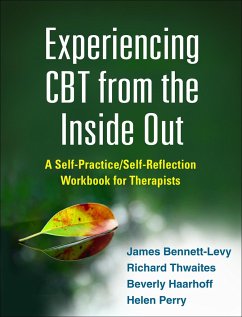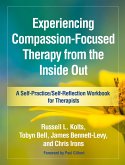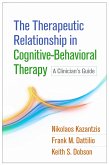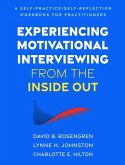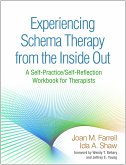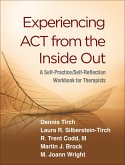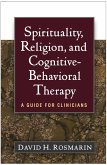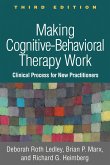James Bennett-Levy (Australia University of Sydney), Richard Thwaites, Beverly Haarhoff (New Zealand Massey University)
Experiencing CBT from the Inside Out
A Self-Practice/Self-Reflection Workbook for Therapists
James Bennett-Levy (Australia University of Sydney), Richard Thwaites, Beverly Haarhoff (New Zealand Massey University)
Experiencing CBT from the Inside Out
A Self-Practice/Self-Reflection Workbook for Therapists
- Broschiertes Buch
- Merkliste
- Auf die Merkliste
- Bewerten Bewerten
- Teilen
- Produkt teilen
- Produkterinnerung
- Produkterinnerung
Engaging and authoritative, this unique workbook enables therapists and students to build technical savvy in contemporary CBT interventions while deepening their self-awareness and therapeutic relationship skills. Self-practice/self-reflection (SP/SR), an evidence-based training strategy, is presented in 12 carefully sequenced modules.
Andere Kunden interessierten sich auch für
![Experiencing Compassion-Focused Therapy from the Inside Out Experiencing Compassion-Focused Therapy from the Inside Out]() Russell L. Kolts (United States Eastern Washington University)Experiencing Compassion-Focused Therapy from the Inside Out60,99 €
Russell L. Kolts (United States Eastern Washington University)Experiencing Compassion-Focused Therapy from the Inside Out60,99 €![The Therapeutic Relationship in Cognitive-Behavioral Therapy The Therapeutic Relationship in Cognitive-Behavioral Therapy]() Nikolaos Kazantzis (Australia Monash University)The Therapeutic Relationship in Cognitive-Behavioral Therapy40,99 €
Nikolaos Kazantzis (Australia Monash University)The Therapeutic Relationship in Cognitive-Behavioral Therapy40,99 €![Experiencing Motivational Interviewing from the Inside Out Experiencing Motivational Interviewing from the Inside Out]() David B. Rosengren (United States Prevention Research Institute)Experiencing Motivational Interviewing from the Inside Out58,99 €
David B. Rosengren (United States Prevention Research Institute)Experiencing Motivational Interviewing from the Inside Out58,99 €![Experiencing Schema Therapy from the Inside Out Experiencing Schema Therapy from the Inside Out]() Joan M. Farrell (Indiana Universityâ Purdue University IndianapoliExperiencing Schema Therapy from the Inside Out60,99 €
Joan M. Farrell (Indiana Universityâ Purdue University IndianapoliExperiencing Schema Therapy from the Inside Out60,99 €![Experiencing ACT from the Inside Out Experiencing ACT from the Inside Out]() Dennis Tirch (United Sta The Center for Compassion Focused TherapyExperiencing ACT from the Inside Out60,99 €
Dennis Tirch (United Sta The Center for Compassion Focused TherapyExperiencing ACT from the Inside Out60,99 €![Spirituality, Religion, and Cognitive-Behavioral Therapy Spirituality, Religion, and Cognitive-Behavioral Therapy]() David H. Rosmarin (McLean Hospital / United S Harvard Medical SchoolSpirituality, Religion, and Cognitive-Behavioral Therapy36,99 €
David H. Rosmarin (McLean Hospital / United S Harvard Medical SchoolSpirituality, Religion, and Cognitive-Behavioral Therapy36,99 €![Making Cognitive-Behavioral Therapy Work Making Cognitive-Behavioral Therapy Work]() Deborah Roth Ledley (United States private practice)Making Cognitive-Behavioral Therapy Work37,99 €
Deborah Roth Ledley (United States private practice)Making Cognitive-Behavioral Therapy Work37,99 €-
-
-
Engaging and authoritative, this unique workbook enables therapists and students to build technical savvy in contemporary CBT interventions while deepening their self-awareness and therapeutic relationship skills. Self-practice/self-reflection (SP/SR), an evidence-based training strategy, is presented in 12 carefully sequenced modules.
Produktdetails
- Produktdetails
- SelfPractice/SelfReflection Guides for Psychotherapists
- Verlag: Guilford Publications
- Seitenzahl: 278
- Erscheinungstermin: 13. Februar 2015
- Englisch
- Abmessung: 266mm x 205mm x 20mm
- Gewicht: 498g
- ISBN-13: 9781462518890
- ISBN-10: 1462518893
- Artikelnr.: 41121194
- Herstellerkennzeichnung
- Libri GmbH
- Europaallee 1
- 36244 Bad Hersfeld
- gpsr@libri.de
- SelfPractice/SelfReflection Guides for Psychotherapists
- Verlag: Guilford Publications
- Seitenzahl: 278
- Erscheinungstermin: 13. Februar 2015
- Englisch
- Abmessung: 266mm x 205mm x 20mm
- Gewicht: 498g
- ISBN-13: 9781462518890
- ISBN-10: 1462518893
- Artikelnr.: 41121194
- Herstellerkennzeichnung
- Libri GmbH
- Europaallee 1
- 36244 Bad Hersfeld
- gpsr@libri.de
James Bennett-Levy, PhD, is Associate Professor in Mental Health at the University Center for Rural Health, University of Sydney, Australia. He has pioneered self-experiential CBT training since his first self-practice/self-reflection (SP/SR) paper in 2001, and has made a significant contribution to the therapist training literature with over 25 CBT training publications. In particular, his 2006 Declarative-Procedural-Reflective model of therapist skill development is widely used and cited. Dr. Bennett-Levy is coauthor or coeditor of several books on CBT practice, including, most recently, the Oxford Guide to Imagery in Cognitive Therapy. Richard Thwaites, DClinPsy, is a consultant clinical psychologist and CBT therapist who serves as Clinical Director for a large National Health Service psychological therapies service in the United Kingdom. In addition to delivering therapy, he provides clinical leadership, supervision, training, and consultancy in CBT, including the implementation of SP/SR programs. His research interests include the role of the therapeutic relationship in CBT and the use of reflective practice in the process of skill development. Beverly Haarhoff, PhD, is a clinical psychologist and Senior Lecturer in the School of Psychology at Massey University, Auckland, New Zealand, where she was instrumental in setting up the first Postgraduate Diploma in CBT in the southern hemisphere. For the past 14 years she has trained and supervised both CBT and clinical psychology trainees. Her research has focused primarily on SP/SR as mechanisms to support and improve therapist skill acquisition in CBT therapists at all levels of development. Dr. Haarhoff has a private clinical practice and regularly presents CBT training workshops. Helen Perry, MA, is Adjunct Senior Lecturer at the University of Sydney and a clinical psychologist in private practice. She played a key role in creating the CBT Diploma Program at Massey University and is an active CBT trainer and supervisor. She served as Project Manager for a research study focusing on online CBT training and coauthored two papers in this area. Ms. Perry has worked across the lifespan in a wide range of clinical settings. Her special interests are in complex/comorbid depression and anxiety, and trauma- and stress-related disorders.
Foreword, Christine A. Padesky
1. Introducing Experiencing CBT from the Inside Out 2. Experiencing CBT
from the Inside Out: The Conceptual Framework 3. Guidance for SP/SR
Participants 4. Guidance for SP/SR Facilitators I. Identifying and
Understanding Unhelpful (Old) Ways of Being
Module 1. Identifying a Challenging Problem
Module 2. Formulating the Problem and Preparing for Change
Module 3. Using Behavioral Activation to Change Patterns of Behavior
Module 4. Identifying Unhelpful Thinking and Behavior
Module 5. Using Cognitive Techniques to Modify Unhelpful Thinking and
Behavior
Module 6. Reviewing Progress
II. Creating and Strengthening New Ways of Being
Module 7. Identifying Unhelpful Assumptions and Constructing New
Alternatives
Module 8. Using Behavioral Experiments to Test Unhelpful Assumptions
against New Alternatives
Module 9. Constructing New Ways of Being
Module 10. Embodying New Ways of Being
Module 11.Using Behavioral Experiments to Test and Strengthen New Ways of
Being
Module 12. Maintaining and Enhancing New Ways of Being
Module Notes
References
Index
1. Introducing Experiencing CBT from the Inside Out 2. Experiencing CBT
from the Inside Out: The Conceptual Framework 3. Guidance for SP/SR
Participants 4. Guidance for SP/SR Facilitators I. Identifying and
Understanding Unhelpful (Old) Ways of Being
Module 1. Identifying a Challenging Problem
Module 2. Formulating the Problem and Preparing for Change
Module 3. Using Behavioral Activation to Change Patterns of Behavior
Module 4. Identifying Unhelpful Thinking and Behavior
Module 5. Using Cognitive Techniques to Modify Unhelpful Thinking and
Behavior
Module 6. Reviewing Progress
II. Creating and Strengthening New Ways of Being
Module 7. Identifying Unhelpful Assumptions and Constructing New
Alternatives
Module 8. Using Behavioral Experiments to Test Unhelpful Assumptions
against New Alternatives
Module 9. Constructing New Ways of Being
Module 10. Embodying New Ways of Being
Module 11.Using Behavioral Experiments to Test and Strengthen New Ways of
Being
Module 12. Maintaining and Enhancing New Ways of Being
Module Notes
References
Index
Foreword, Christine A. Padesky
1. Introducing Experiencing CBT from the Inside Out 2. Experiencing CBT
from the Inside Out: The Conceptual Framework 3. Guidance for SP/SR
Participants 4. Guidance for SP/SR Facilitators I. Identifying and
Understanding Unhelpful (Old) Ways of Being
Module 1. Identifying a Challenging Problem
Module 2. Formulating the Problem and Preparing for Change
Module 3. Using Behavioral Activation to Change Patterns of Behavior
Module 4. Identifying Unhelpful Thinking and Behavior
Module 5. Using Cognitive Techniques to Modify Unhelpful Thinking and
Behavior
Module 6. Reviewing Progress
II. Creating and Strengthening New Ways of Being
Module 7. Identifying Unhelpful Assumptions and Constructing New
Alternatives
Module 8. Using Behavioral Experiments to Test Unhelpful Assumptions
against New Alternatives
Module 9. Constructing New Ways of Being
Module 10. Embodying New Ways of Being
Module 11.Using Behavioral Experiments to Test and Strengthen New Ways of
Being
Module 12. Maintaining and Enhancing New Ways of Being
Module Notes
References
Index
1. Introducing Experiencing CBT from the Inside Out 2. Experiencing CBT
from the Inside Out: The Conceptual Framework 3. Guidance for SP/SR
Participants 4. Guidance for SP/SR Facilitators I. Identifying and
Understanding Unhelpful (Old) Ways of Being
Module 1. Identifying a Challenging Problem
Module 2. Formulating the Problem and Preparing for Change
Module 3. Using Behavioral Activation to Change Patterns of Behavior
Module 4. Identifying Unhelpful Thinking and Behavior
Module 5. Using Cognitive Techniques to Modify Unhelpful Thinking and
Behavior
Module 6. Reviewing Progress
II. Creating and Strengthening New Ways of Being
Module 7. Identifying Unhelpful Assumptions and Constructing New
Alternatives
Module 8. Using Behavioral Experiments to Test Unhelpful Assumptions
against New Alternatives
Module 9. Constructing New Ways of Being
Module 10. Embodying New Ways of Being
Module 11.Using Behavioral Experiments to Test and Strengthen New Ways of
Being
Module 12. Maintaining and Enhancing New Ways of Being
Module Notes
References
Index

